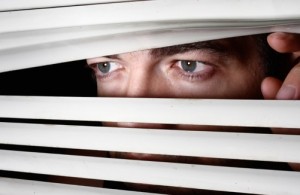Understanding Paranoia
What is Paranoia?
The term paranoia is often used loosely in general conversation and it is important to define it and to look at how our common usage of the term differs so greatly from the sort of paranoia experienced by people with schizophrenia.
Paranoia can be thought of as thoughts of something bad happening to you and which are likely to be caused by someone or something. In the context of mental illness, these thoughts are often extreme or exaggerated and commonly have no or very little foundation in facts. Examples of this kind of paranoid thinking are that neighbours are spying on you or harassing you or that your partner is being unfaithful.
When discussing paranoid thinking it is important to make a couple of qualifications. First of all not all paranoid thinking of this kind is entirely without foundation. For instance: it may well be that a jealous work colleague is interfering with your post in order to make your life difficult if he is keen on getting your job or that your partner is indeed having an illicit and secretive affair with another. Such things do happen in the world.

Suspecting that we may have been short changed deliberately by a shop assistant is not evidence of mental ill health, it is a normal reaction. (Image: I Stock)
In addition it is important to acknowledge that we all, from time to time, become suspicious of people around us. For instance, if we are short- changed by a shop assistant we may suspect them of having done it deliberately. It is important that we have a clear understanding that such thinking is completely sane and that we do not attempt to pathologise it. It is a world away from the kinds of complex webs of extreme paranoid belief structures that can drown out other thinking and cause intense suffering in people with schizophrenia.
It is also important to realise that definitions of paranoia vary between different cultures. For instance, in the US today (and to a lesser extent here in the UK), there is a very large and enthusiastic survivalist movement (who often call themselves “preppers”). These are people who are convinced that the end of western civilisation is just around the corner and are making often expensive and sophisticated preparations for surviving the event. These people are often educated and clever and lead otherwise quite normal lives. Whilst many of us would consider it crazy to spend a large proportion of our disposable income on preparing for “the end of the world as we know it” this very large group of people think it very normal and even sensible behaviour.

Conspiracy theories around every issue from 9/11 to climate change abound in our media and are part of the paranoia of everyday life. (Image: I Stock)
Similarly we see examples in our media of journalists promoting conspiracy theories about everything from HIV/AIDS to climate change. We have here examples of what Kantor calls the paranoia of everyday life that constitutes a gray area which intervenes between sanity and insanity4.
However paranoid thinking can often be extreme and abnormal and may be a problem in itself for some people for which they will need to seek help. Paranoia of this kind can also affect people who do not suffer with any diagnosed mental illness.
Causes of Paranoia
Paranoia on its own is not a mental health diagnosis : it is instead an indicator of an underlying problem or illness. In addition to being caused by schizophrenia, paranoia can also occur in other mental health conditions such as schizo-affective disorder, depression, bipolar disorder, delusional disorder and some personality disorders. It also occurs in some organic brain diseases such as Huntington’s disease, Parkinson’s disease and strokes1&12. It may also be caused by the use of some street drugs particularly cannabis, methamphetamine and cocaine6. Lack of sleep will also cause paranoia.
There are also environmental factors that can cause paranoia, for instance a heightened awareness of crime caused by excessive media reporting. Some life experiences such as traumatic relationship breakdowns, trauma during childhood and sudden loss of employment can all make people feel paranoid and may lead to excessive paranoid thoughts.
What is Paranoid Schizophrenia?
Schizophrenia does not affect all people in exactly the same way although there are many common features and so over time psychiatrists have been able to divide schizophrenia into a number of sub types. These are; paranoid schizophrenia, disorganised or hebephrenic schizophrenia, catatonic schizophrenia and residual schizophrenia. A diagnosis of paranoid schizophrenia will be given where the individual has prominent delusions and hallucinations which have persecutory or grandiose themes.
People with paranoid schizophrenia may often suffer more from the positive symptoms such as delusions and hallucinations but will be less troubled by negative symptoms such as social withdrawal and blunted emotions.
How Does Paranoia Affect People With Schizophrenia?
People with schizophrenia have a very different experience of paranoia to those examples given above. Their paranoid beliefs are often very extreme and sophisticated, believing for instance that it is not simply one neighbour that is spying on them but that the whole town is involved in the conspiracy. Psychiatrists call these kinds of beliefs persecutory delusions.

In schizophrenia the sufferer becomes totally convinced by their paranoid beliefs and no amount of reasoning will change their minds. (Image: I Stock)
In schizophrenia the paranoid beliefs will often be very fixed. The individual will be totally convinced by these beliefs and will not be open to any suggestion by relatives, friends or therapists that they are simply wrong about the whole thing. The paranoid belief structure may also dominate their thinking and affect their ability to carry out their normal functioning such as working or looking after themselves. They may become totally obsessed with trying to defeat the conspiracy and take all sorts of sophisticated measures to overcome the people that they see as behind it5.
People with schizophrenia also share considerable common ground in their paranoid beliefs which often tend to reflect the spirit of the age. Ideas around religion used to dominate psychotic thinking whereas now beliefs that the individual is being spied on by the security services, that electronic devices have been implanted in them and that the internet is being used to spy on them are more common10.

John Nash, the Nobel prize winning mathematician believed that he was being sent coded messages hidden in numbers. (Image: Everett Collection on Shutterstock)
The paranoid ideas and beliefs may well progress from the just plausible to the fantastic over a period of time. For instance the person may start with beliefs that they are being spied on by neighbours or work colleagues; this belief may then go through another stage of believing that it is MI5 and the government who are doing the spying until they finally come to believe that the real culprits are aliens or God5.
In schizophrenia the paranoid beliefs often occur alongside other schizophrenia symptoms such as hearing voices (psychiatrists call these auditory hallucinations). More often than not these voices will also be persecutory. The person with schizophrenia will therefore hear a constant succession of persecutory messages from their voices which seem to support and reinforce the persecutory ideas that are coming from their delusions and together these two sets of experiences provide a very powerful influence in their lives.
The effect of this persecutory onslaught will often be enormous levels of stress (similar to and sometimes exceeding the levels of stress that soldiers experience in combat) and a total defeat of the person’s self-esteem5. Is it really any wonder then that they lack insight into their condition or sometimes lash out at those they genuinely believe are responsible?
For most people with schizophrenia the illness can be a substantial part of their life for several years and may occur as a series of episodes interspersed with periods of wellness. If paranoid delusions are a feature of the first episode of schizophrenia then they will tend to re-appear in subsequent episodes8.
Schizophrenia tends to be a condition of young people with three quarters of diagnoses in the UK being made between ages 16 and 25, however late onset is not unknown and where the condition does occur in later life paranoid symptoms are likely to be much more prominent than when the illness strikes earlier9.
Paranoid delusions affect different people with schizophrenia differently but here is the description of one person, David, who experienced paranoia in the early stage of a schizophrenic break down:
“First of all I began to believe that people were following me. Now I had for some time had an acrimonious dispute with my next door neighbour over an issue of noise and I knew that he was not averse to doing things intended to annoy me, so when I noticed that I was being followed I immediately put the blame on him or one of his friends.
However, over the next nine months my perceptions of being spied on progressively expanded to really massive proportions. I started to believe that my post was being intercepted, that my ‘phone was bugged, that microphones and secret cameras had been concealed in the walls of my house and my office. And these were not simply suspicions: I became very quickly convinced of these things and no amount of reasoning would shake that belief.
As the illness developed these ideas coalesced into a larger belief, again unshakeable, that I was at the centre of a huge conspiracy involving a very large number of people with enormous power who, for reasons I could not comprehend, were spying on me and harassing me.
I took these suspicions to various official agencies including BT, the Royal Mail and the police and shared them with friends and family but ultimately the help that they offered became useless because as time went on I became convinced that those people were also part of the conspiracy.
It is very difficult to describe my state of mind at the end of that process. Frantic with fear I took to sleeping with a knife under my pillow and furniture piled up against the bedroom door so that no one could get into my room while I was asleep. That is when I could sleep”.
Faced with such an enormous perceived threat the person with schizophrenia will often retreat into their room or their house to try to escape from those seeking to cause them harm. They will often try to defeat their oppressors. For instance if they think they are being followed they will take erratic and circuitous routes in order to confound those trailing them. In a few cases they may also try to fight back against their enemies physically.
Problems that Paranoia Causes for Carers of People with Schizophrenia

Believing that medication is an attempt to poison them is an all-too-common belief in schizophrenia and complicates treatment considerably. (Image: I Stock)
Some people with schizophrenia develop beliefs that the antipsychotic medicines that they have been prescribed are poisons and that the doctor is actually trying to kill them and for this reason may stop taking their medication2. Carers should always be on the look out for this as the antipsychotic medications remain the first line of defence against psychotic thinking.
However it should be acknowledged that in general people with schizophrenia are no worse at taking their medication than people with chronic physical conditions such as diabetes or high blood pressure3. Insight or to be more precise lack of insight, does however remain a problem for those caring for people with schizophrenia as approximately half of people diagnosed do not come to accept that they are sick7.
Similarly for someone suffering from schizophrenia who has complex and intense paranoid beliefs secrecy may be very important. It may be very difficult if not impossible for them to share the thoughts, ideas and beliefs that they have been having with other people around them or with the doctors. This may delay diagnosis considerably5. This is one of the cruellest aspects of the schizophrenia condition: that the illness itself can make it difficult if not impossible at times for the person suffering to ask for or obtain help. There is no physical condition that mimics this effect.
Paranoia and Dangerous Behaviour
One of the most difficult aspects of paranoia for carers and relatives is the risk of violence. Sometimes it happens that an individual suffering from intense paranoia and genuinely believing themselves to be under threat of physical harm will decide to strike first to eliminate what they see as the threat and this may result in violence sometimes to a complete stranger, sometimes to someone close to them.
The other reaction, that of self harm, however occurs even more frequently and the person with schizophrenia may attempt to take their own life in order to escape from the unending suffering that they perceive from this campaign of spying and harassment they are enduring5. You can read more about dangerous behaviour on our information sheet.
In the case of violent behaviour the existence of paranoid thinking as a motive for the attack does, in English law at least, constitute a defence and may result in the person being found unfit to stand trial or, if the trial proceeds, provide the defence of “not guilty by reason of insanity”11.

Sir Robert Peel, British Prime Minister: an attempt on his life in 1843 gave us rules on insanity in the criminal courts.
The criteria for such a defence are set out in the M’Naghten Rules (named after a Daniel M’Naghten who in 1843 tried to kill Sir Robert Peel, the Prime Minister, but ended up killing his secretary). Although rather dated, the rules do still set out a comprehensive definition of the conditions necessary for achieving such a defence.
However, in practice, for complex and historical reasons, defence legal teams tend to be reluctant to use a mental health defence and quite erroneously see a mental health disposal as being the worst possible outcome they can achieve for their client. This approach has resulted in far too many people with schizophrenia being sent to prison instead of to hospital where they belong and has often delayed diagnosis and treatment.
Suggestions for Further Reading
1. Me, Myself and Them, Kurt Snyder, Oxford University Press. An extremely insightful account of one young man’s struggle with paranoid schizophrenia.
2. The Day the Voices Stopped, Ken Steele, Basic Books. An insightful and deeply moving story of a man’s journey through paranoid schizophrenia and particularly of his struggle with persecutory voices for three decades.
References
1. Torrey E, 2013 Surviving Schizophrenia, Harper Perennial, p28 and 64.
2. Torrey E, 2013 Surviving Schizophrenia, Harper Perennial, p257.
3. Tacchi M and Scott J, 2005, Improving Adherence in Schizophrenia and Bipolar Disorders, Wiley, p23.
4. Kantor M, 2004, Understanding Paranoia, Praeger, p69.
5. Author’s personal experiences.
6. Torrey E, 2013 Surviving Schizophrenia, Harper Perennial, p76.
7. Torrey E and Bowler A, 1994, Schizophrenia and Manic-Depressive Disorder, Basic Books, p27.
8. Howe G, 1995, Working with Schizophrenia: A Needs Based Approach, Jessica Kinglsey, p20.
9. Torrey E, 2013 Surviving Schizophrenia, Harper Perennial, p97.
10. Torrey E, 2013 Surviving Schizophrenia, Harper Perennial, p27.
11. Smith J, 1999, Smith and Hogan Criminal Law, Butterworths p196.
12. Kantor M, 2004, Understanding Paranoia, Praeger, p171.







